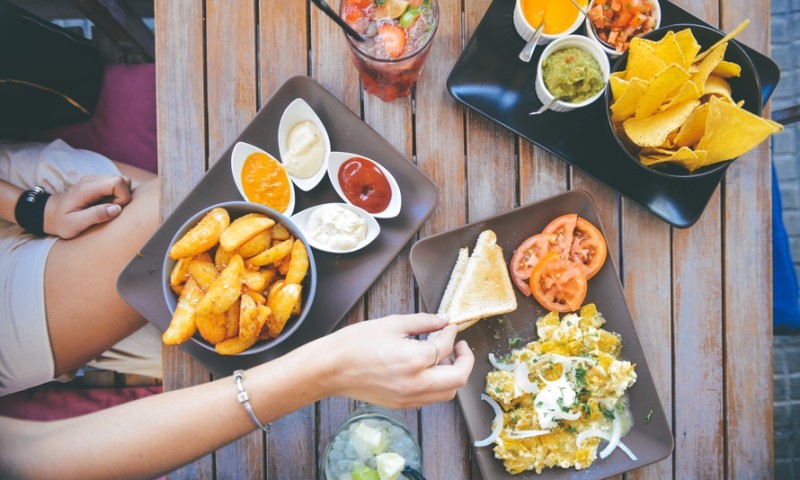For some women overeating means bingeing and for others it means consuming more or other than planned. Most of us are overeating for a hundred different reasons. We are eating due to stress, irritation and frustration. It may be worry or overwork. We eat because our stomach feels ‘blah’. We are eating out of habit and with no real direction or thoughts about what we are doing with our face in the fridge.
Identify, the ten “triggers” for overeating and then try to overcome them:
Beat it by: If you are just grabbing anything out of the refrigerator, make something healthy like cut veggies and leave them in the fridge.
Beat it by: Focusing on balancing the calorie input to calorie output. Model healthy eating and exercise habits. Do this as a genuine concern for your own well-being. Eating high fat foods in moderation will do no harm.
Beat it by: seeking professional advice from a dietician or psychologist who will help you overcome the feeling of disgust and hatred. Map out a recovery plan in close consultation and then try to stick with it to develop a positive self-image. Define your own personal values – those that are right for your individual authentic self. Each of you must discover who you are inside, what your innate talents and gifts are and then find the joy and strength to nurture those gifts to their fullest – regardless of anyone else’s opinions.
Beat it by: Spreading the calories out by eating a small amount frequently can help maintain a normal blood glucose level. This means every ~3 hours. A recommendation is to be slightly hungry before the next eating event. If famished, then the interval between eating events is probably too long or too little was eaten at the last eating event. If one approaches the next eating event full then too much was consumed at the last eating event. The macronutrients, protein and fat, in combination with carbohydrate have the potential to delay the rise in blood glucose. Protein is preferred as fat interferes with the effectiveness of insulin. Complex carbohydrates leave the stomach more slowly than simple carbohydrate and therefore can also help in blood glucose regulation. Complex carbohydrates contain fiber. Soluble fiber is especially beneficial for this condition. If blood glucose levels do not rise rapidly, there is less likelihood of excessive insulin secretion and less appetite stimulation. It’s important to increase water consumption along with an increase in protein or fiber. Water carries nutrients and oxygen to cells and removes waste. Eating a high fiber diet requires extra water to process the additional roughage and to prevent constipation.
Beat it by: Turning off the TV off and engaging in a hobby that keeps your mind and hands busy. Another solution to stress-related overeating is to address the sources of stress. Acknowledge and address feelings of depression, anger or anxiety. Do whatever you can to reduce feelings of stress, like writing a journal, talking with a friend, or exercise.
Beat it by: Identifying your low-energy times of day and substitute them with other activities for eating. Take a 10-minute walk or a water-cooler chat break. There are healthier ways of nurturing yourself, such as getting plenty of rest and relaxation, reading a good book, or taking a quiet walk.
Beat it by: Taking out some time for yourself and relaxing. Pamper yourself by going out for a facial, manicure or pedicure. Take out the children to a nearby park where you can walk and relax along with the kids.
Beat it by: Do what can be done. Trust me, you will be amazed with your own capacity of performance. Reinforce the feeling of achievements in you instead of submitting to the pressure. Emotional eating is sometimes considered well within the range of normal behavior. However, problems arise when emotional eating becomes excessive and interferes with lifestyle quality and good health. If you feel emotional eating is a problem, it may be wise to work with a counselor trained in eating disorders.
Beat it by: Going out in the open air and walk, The mini-blast of oxygen will vanquish tiredness and mental exhaustion. Leave your worries behind and be in the moment. Look at the birds. Be thankful. Let go, breathe deeply and relax. You may discover God has always been with you!
Beat it by: developing a strong will-power. Every women has the capacity to build up or strengthen her willpower by exercising it in times of need. Lifting weights develops muscles, and exercising willpower makes it stronger. Add self-discipline in your life to become more aware of how you use your willpower in the course of all your daily activities.
Constructive identification and learning to cope with emotional and physiological triggers is an important key towards lifelong physical, mental, emotional and social health.

